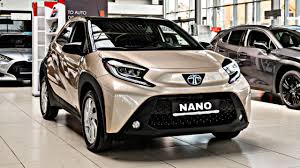
The Tata Nano EV: A Transformative Force in Affordable Electric Mobility
The automotive sector is experiencing a significant transformation with the swift integration of electric vehicles (EVs). As global efforts intensify to lessen the environmental repercussions of conventional gasoline-powered vehicles, electric cars have emerged as leaders in the quest to decrease carbon emissions.
Among the various manufacturers making notable advancements in this domain, Tata Motors, one of India’s most esteemed automobile producers, is on the verge of making a significant impact with the introduction of the Tata Nano EV. This latest version of the iconic Nano is set to reshape the electric mobility landscape with its remarkably affordable pricing and commendable mileage.
With a starting price of merely Rs. 2.5 lakh, this new variant of the Nano has the potential to transform India’s approach to electric vehicle adoption.
The Legacy of the Nano
The original Tata Nano, introduced in 2008, garnered attention for its ambitious goal of delivering an economical vehicle for the masses. Promoted as the “world’s cheapest car,” the Nano was designed to provide a compact and budget-friendly option for middle-class families in India.
Despite its initial promise and the high expectations surrounding it, the Nano encountered several obstacles, including marketing errors, production setbacks, and a disconnect between the vehicle’s design and consumer expectations. Nevertheless, the Nano made a lasting impression on the Indian automotive landscape, with its compact dimensions, innovative engineering, and affordability being groundbreaking at the time.
Although the Nano did not reach the anticipated level of success, it established a foundation for an exciting new phase in Tata Motors’ journey. Today, Tata Motors has reimagined the Nano to align with the swiftly changing realm of electric mobility. The Tata Nano EV builds upon the legacy of its predecessor, envisioning a future where electric vehicles are poised to take center stage.
Remarkable Efficiency and Range
A key advantage of the Nano EV is its remarkable mileage capacity.
In a time when fuel efficiency is a critical factor for consumers, the Nano EV offers outstanding value.
This electric vehicle is anticipated to provide a range of approximately 200 kilometers on a single charge, which adequately accommodates the typical daily commute in Indian urban areas.
With a range of 200 kilometers, the Nano EV competes favorably with other higher-priced electric vehicles available in the market.
Thanks to advancements in battery technology and the development of charging infrastructure, the range is projected to increase in the future, enhancing the appeal of the Nano EV.
For city residents, who generally travel between 30 and 50 kilometers each day, the Nano EV’s range sufficiently fulfills their daily transportation requirements.
Charging times are also a vital consideration for prospective buyers, and Tata Motors has taken steps to ensure that the Nano EV meets this need.
The vehicle features fast-charging capabilities, enabling owners to charge it up to 80% in just a few hours.
Moreover, Tata Motors has collaborated with various charging infrastructure providers to broaden the network of public charging stations throughout India, facilitating easier charging options for Nano EV owners while they are on the move.
Remarkable Efficiency and Range
A key advantage of the Nano EV is its remarkable mileage capacity.
In a time when fuel efficiency is a critical factor for consumers, the Nano EV offers outstanding value.
This electric vehicle is anticipated to provide a range of approximately 200 kilometers on a single charge, which adequately accommodates the typical daily commute in Indian urban areas.
With a range of 200 kilometers, the Nano EV competes favorably with other higher-priced electric vehicles available in the market.
Thanks to advancements in battery technology and the development of charging infrastructure, the range is projected to increase in the future, enhancing the appeal of the Nano EV.
For city residents, who generally travel between 30 and 50 kilometers each day, the Nano EV’s range sufficiently fulfills their daily transportation requirements.
Charging times are also a vital consideration for prospective buyers, and Tata Motors has taken steps to ensure that the Nano EV meets this need.
The vehicle features fast-charging capabilities, enabling owners to charge it up to 80% in just a few hours.
Moreover, Tata Motors has collaborated with various charging infrastructure providers to broaden the network of public charging stations throughout India, facilitating easier charging options for Nano EV owners while they are on the move.


